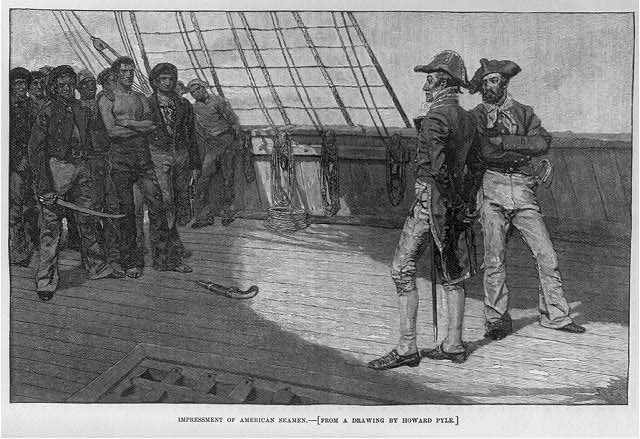Isaac D. Simkins, born on 13 January 1775, left Northampton County at age 21 to go to sea. Like many people leaving home on a sea voyage, he wrote his will before departing in June 1796. He asked that his body be decently buried and lent his mother, Anne Simkins, £300 from his estate for her natural life. After her death, the remaining part of his estate would go to his brother, John Simkins, and his heirs. The will, recorded on 10 July 1797, became a point of contention in the Northampton County Chancery Cause Walter C. Gardiner & wife, etc. vs. John Simkins, 1813-008.
In an otherwise mundane estate dispute, the cause of Isaac Simkins’ death was a fascinating side-note. In a deposition, Isaac’s brother, Arthur Simkins, revealed that Isaac had been “impressed by a British Man of War” and died shortly afterwards.
The war between Great Britain and France began in 1793 and continued until 1815. The British Navy used a brutal form of punishment called “flogging” on their sailors, prompting many British sailors to escape to American vessels. Some joined the United States Merchant Marines and others joined the United States Navy. The British Navy used the excuse of looking for their deserted sailors as a right to board American merchant vessels to look for the deserters and contraband. The British Navy would re-impress their deserters found on American ships.
The British Navy also impressed naturalized American citizens who were born in Great Britain, enforcing a doctrine which stated that once a citizen of Great Britain, always a citizen of Great Britain. After a while, the British Navy impressed native-born American seamen as well. The impressment of American sailors was a contributing factor in the War of 1812.
Isaac Simkins was not the only Virginian to find himself at the mercy of the Royal Navy. Letters found in the Northumberland County Chancery Cause Margaret B. Hudnall, etc. vs. Nancy Waddy, etc., 1820-001, reveal the fate of Alexander Waddy, who left for Europe in 1809 never to be heard from again.
Writing aboard the HMS Garland while docked in Port Royal, Jamaica, on 1 August 1809, Thomas Witcher related events leading up to Alexander Waddy’s death. Waddy was “castaway in the Abeona on the coast of Ireland.” From there he went to Liverpool and boarded the Rosanna to sail for New York, but on that passage he was impressed by the British Navy and forced to board the HMS Muros. Waddy presumably met Witcher aboard the Muros, and the pair, both “broken hearted” over their situation, made a pact to contact each other’s friends and family if one of them reached home and safety. The Muros ran aground, and Waddy saw this as an opportunity to make his escape. Unfortunately, six days later, Waddy passed away from unknown causes on board a vessel bound for Halifax. In his letter, Thomas Witcher conveyed that Waddy’s last words expressed his desire that “his mother know what was become of him.”
The United States Congress addressed the issue of impressed American seamen by passing an act in 1796 entitled “An Act for the relief and protection of American Seamen,” which provided certificates for the protection of seamen against the threat of impressment by the Royal Navy. The statute is found in United States Statutes at Large, Volume 1, Fourth Congress, First Session, Chapter 36, pages 477-478.
Additional records for American merchant seamen impressed by the British Navy can be found in the National Archives in their Records About Impressed Seamen, 1793-1814, collection. Ancestry.com also has information on their website in the form of applications for U.S. Seamen’s Protection Certificates, 1792-1868, which have been indexed and digitized, and the Indexes to Seamen’s Protection Certificate Applications and Proofs of Citizenship, which includes approximately 50,000 names of seamen who filed for Seamen Protection Certificates between 1796 and 1861.
The Northumberland County Chancery Causes, 1759-1912, have been digitized and are available online through the Chancery Records Index.
-Louise Jones, Local Records Archivist













One Comment